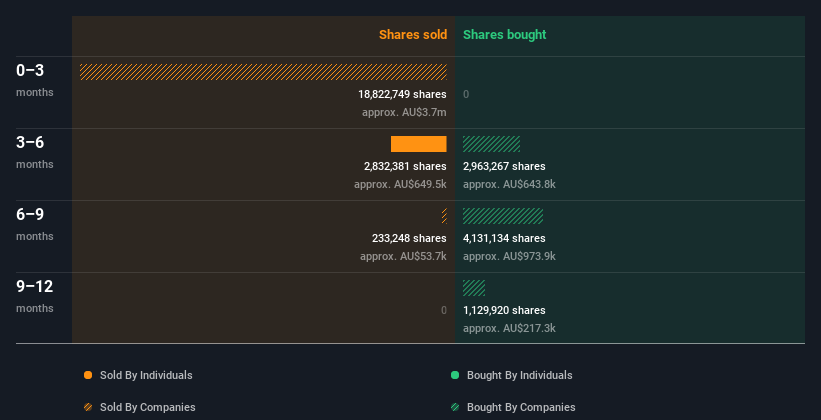
Earlypay Limited (ASX:EPY) shareholders might have a reason to worry after multiple insiders sold their shares over the last year. When evaluating insider transactions, knowing whether insiders are buying is usually more beneficial than knowing whether they are selling, as the latter can be open to many interpretations. However, if numerous insiders are selling, shareholders should investigate more.
While insider transactions are not the most important thing when it comes to long-term investing, logic dictates you should pay some attention to whether insiders are buying or selling shares.
View our latest analysis for Earlypay
Earlypay Insider Transactions Over The Last Year
Over the last year, we can see that the biggest insider sale was by the insider, Gregory Riley, for AU$389k worth of shares, at about AU$0.21 per share. So it's clear an insider wanted to take some cash off the table, even below the current price of AU$0.21. As a general rule we consider it to be discouraging when insiders are selling below the current price, because it suggests they were happy with a lower valuation. While insider selling is not a positive sign, we can't be sure if it does mean insiders think the shares are fully valued, so it's only a weak sign. This single sale was just 11% of Gregory Riley's stake.
In the last year Earlypay insiders didn't buy any company stock. You can see the insider transactions (by companies and individuals) over the last year depicted in the chart below. If you want to know exactly who sold, for how much, and when, simply click on the graph below!

If you are like me, then you will not want to miss this free list of small cap stocks that are not only being bought by insiders but also have attractive valuations.
Does Earlypay Boast High Insider Ownership?
Another way to test the alignment between the leaders of a company and other shareholders is to look at how many shares they own. I reckon it's a good sign if insiders own a significant number of shares in the company. From our data, it seems that Earlypay insiders own 14% of the company, worth about AU$8.6m. Whilst better than nothing, we're not overly impressed by these holdings.
What Might The Insider Transactions At Earlypay Tell Us?
It doesn't really mean much that no insider has traded Earlypay shares in the last quarter. The insider transactions at Earlypay are not inspiring us to buy. And usually insiders own more stock in the company, according to our data. While it's good to be aware of what's going on with the insider's ownership and transactions, we make sure to also consider what risks are facing a stock before making any investment decision. To help with this, we've discovered 3 warning signs (2 make us uncomfortable!) that you ought to be aware of before buying any shares in Earlypay.
If you would prefer to check out another company -- one with potentially superior financials -- then do not miss this free list of interesting companies, that have HIGH return on equity and low debt.
For the purposes of this article, insiders are those individuals who report their transactions to the relevant regulatory body. We currently account for open market transactions and private dispositions of direct interests only, but not derivative transactions or indirect interests.
Valuation is complex, but we're here to simplify it.
Discover if Earlypay might be undervalued or overvalued with our detailed analysis, featuring fair value estimates, potential risks, dividends, insider trades, and its financial condition.
Access Free AnalysisHave feedback on this article? Concerned about the content? Get in touch with us directly. Alternatively, email editorial-team (at) simplywallst.com.
This article by Simply Wall St is general in nature. We provide commentary based on historical data and analyst forecasts only using an unbiased methodology and our articles are not intended to be financial advice. It does not constitute a recommendation to buy or sell any stock, and does not take account of your objectives, or your financial situation. We aim to bring you long-term focused analysis driven by fundamental data. Note that our analysis may not factor in the latest price-sensitive company announcements or qualitative material. Simply Wall St has no position in any stocks mentioned.
Have feedback on this article? Concerned about the content? Get in touch with us directly. Alternatively, email editorial-team@simplywallst.com
About ASX:EPY
Mediocre balance sheet low.
Similar Companies
Market Insights
Community Narratives





